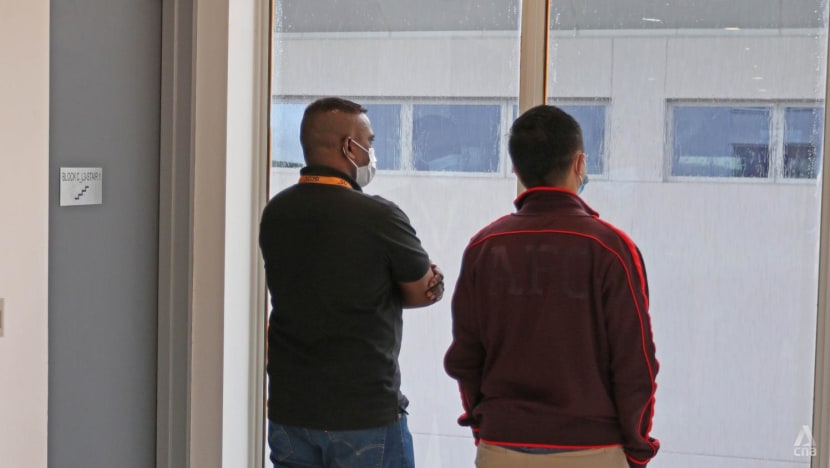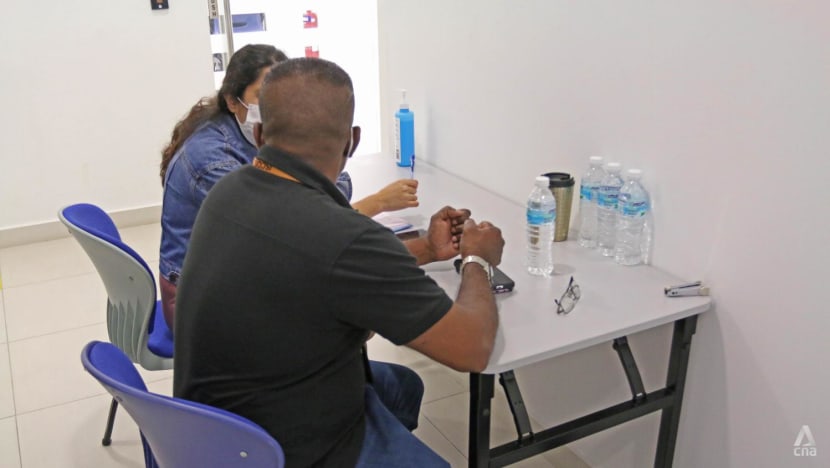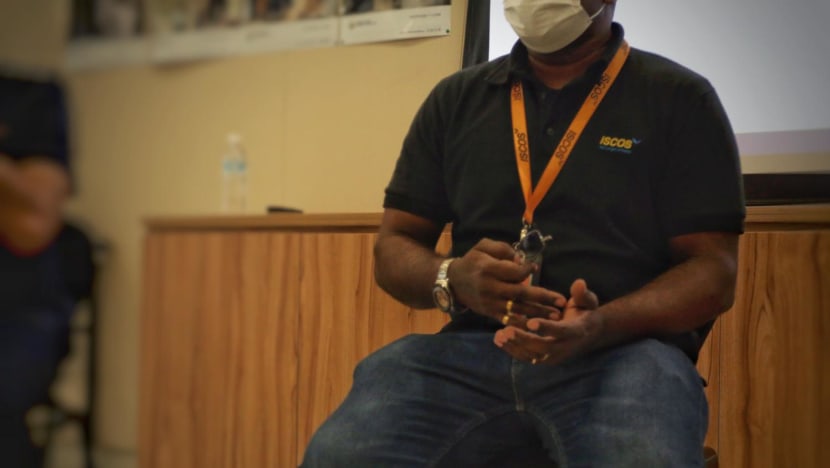
SINGAPORE: John (not his real name) is no stranger to life behind bars.
Coming from a broken family, he was 14 when he joined a gang. Soon he committed crimes involving violence, drugs and housebreaking. This meant he spent his teenage years going in and out of prison.
In 2007, John was sentenced to eight years of corrective training, a more serious form of imprisonment without early release, usually for reoffenders.
It was during this latest stint, when John’s then-10-year-old son visited him, that reality sank in.
“He said, ‘Dad, when are you going to come out?’ I looked at him, dumbfounded, and asked why,” John, now 49, told reporters during the Singapore Prison Service’s (SPS) annual statistics briefing on Tuesday (Feb 8).
When his son said it was because most children had parents who sent them to school, John remembers feeling “really touched”.
“I went back to my cell and asked myself what I was doing in there. Is there no life for me (outside)?” he thought to himself.
John decided it was time to straighten out his life.
He attended religious counselling sessions on repenting and making a change. He completed intervention programmes to reduce his dependence on drugs. He understood that drugs made him violent and led him to more serious crimes.
But a cloud still hung over him: His affiliation to his gang. Getting rid of this would not be that simple. Fellow inmates knew of his ties and the things he did as a gangster. Some could even be from the same gang.
According to SPS figures, close to one quarter of the 7,572 inmates who entered prison in 2021 had gang affiliations.
“They are still holding the image; that is something they want to survive,” John said of these inmates, adding that some would still get involved in fights.
“But actually, it’s nothing. If you ask them why they fight, at the end of the day, they don’t have an answer for that. It’s just their own imagination; they think, ‘I must do this.’”
John had told prison officers he didn’t want to be a gangster anymore, but the prison at the time did not have an official way of recognising this.
“I already told them I don’t want to be in the game,” he stressed. “This is my life. I need to make this decision.”
Then in 2009, SPS launched the Gang Renunciation Programme, which includes a formal renunciation ceremony and support for inmates who choose to live gang-free.
So when prison officers asked John about taking part, he immediately agreed. Fellow inmates who were gang members made their feelings known.
“They tried to suppress me and stop me. They said, ‘Don’t do it here. As a gangster you need to go and …’ I said no. I need to cut off everything here,” John said.
“Because renunciation is not only renouncing secret societies, it’s also renouncing all my bad activities. That’s where I stood firm.”

John recalled the day he stood before other inmates, sweating but determined to renounce his gang membership. He knew that some of them were still active gang members who were well known in the scene.
“When I stood in front of them, they looked at me and asked if this is the guy who wants to renounce, because of my past history and what I did for the secret society,” he said. “That’s also a big shock for them.”
While John’s ceremony was witnessed only by other inmates, the current practice is to invite the inmate’s family members, counsellors and prison staff.
This came after SPS reviewed the process and realised how important it was for inmates to make the commitment in the presence and support of family members.
“It’s a very powerful statement, because that’s when you stand firm in front of people who could be fellow gang members to renounce your gang,” said Superintendent of Prisons (Supt) Chin Soon Theen, a senior assistant director in SPS’ Operations Division.
PRISON ASSAULT RATE
Helping inmates renounce gangs is one way SPS takes “preventive steps” to reduce violence in prison, the agency said in a news release.
According to SPS’ latest stats, the prison assault rate for financial year 2021 is projected to be around 46 assaults per 10,000 inmates. The rates have “stabilised” since FY2019 and FY2020, SPS said, when it was about 46 and 47 respectively.
The recent rates have gone up from the past few years, when they ranged from 24.4 in FY2016 to 39.1 in FY2018.
Still, SPS said its assault rate is “low” when compared to correctional institutes in other jurisdictions.
The rate typically covers attacks by inmates on prison officers or fellow inmates, during which victims sustain serious injuries, SPS said. These inmates are charged under aggravated prison offences.
“Assaults and fights between inmates happen mainly due to interpersonal differences between inmates, and their struggles to manage their anger and negative emotions,” SPS added.
“Some incidents involve inmates assaulting the staff when the inmates are corrected or stopped by staff for not complying with prison rules and regulations.”
STIGMA OF LEAVING GANGS
But for some inmates, renouncing their gangs could lead to more problems with their peers.
“Some of them may face stigmatisation or issues along the way clearly, because of their entrenched gang affiliation,” Supt Chin said. “We provide support groups to … enhance their resolve to resist joining gangs subsequently.”
Inmates who feel pressured by their peers can approach prison officers at any time to request for counselling sessions or support. There is also a free tattoo removal programme to help them further disassociate from gangs, SPS said.
To date, 1,463 inmates have taken part in the Gang Renunciation Programme since its launch in 2009, SPS said.
The agency said it does not track this figure as a proportion of the total number of inmates who entered prison with gang affiliations since 2009, although it added that more than 100 inmates take part in the renunciation ceremony each year.

John said the renunciation gave him a sense of “freedom”, adding that a fellow inmate who tried to dissuade him eventually approached him during yard time months later as he was interested to do the same.
“Before I renounced, I didn’t know what I was living for, because another person’s problem (in prison) will be my problem,” he said.
“After renunciation, my issue is my issue. I can focus on that. So, I got no problems and I need not live for anybody. I just need to carry on living for myself.”
John kept to this ethos even after he was released in 2014. Now he works with the Industrial and Services Co-Operative Society as a mentor, regularly returning to prison to counsel wayward inmates and encourage them to sever gang ties.
“When I went out from prison, it was quite difficult because other gang members looked at me and think that I am faking and putting up an image,” he said. “But today, when they see what I’m doing, they just (go) on their way.”
RECIDIVISM AT RECORD LOW
The SPS statistics also highlighted that the recidivism rate has dropped further, from the all-time low of 22.1 per cent for the 2018 cohort to 20 per cent for the 2019 cohort.
The rate refers to the percentage of local offenders who were detained, jailed or sentenced to day reporting order within two years of their release.
SPS said it will keep recidivism rates low by continuing to develop and implement evidence-based rehabilitation programmes, and provide structured support for eligible inmates serving the tail-end of their sentence in the community.
“Such support includes providing them with opportunities to enhance their employability and stay employed, and supporting them in rekindling family bonds and building pro-social networks,” SPS added.